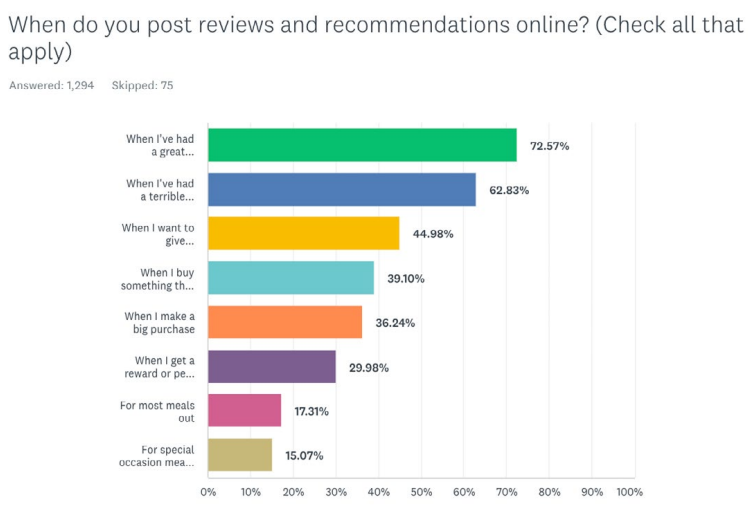

To put it simply, customer reviews are an integral part of our daily lives now, informing what we purchase, where we go, where we eat, etc, and a new survey out from Chatmeter, a reputation management and brand intelligence company, shows just how crucial customer reviews have become in the retail experience. Not only can they help people make decisions, they can be used to help build relationships between consumers and brands.
Conducted in January 2023, the survey found that all not only had all 1,369 consumers used a review to help in the decision-making process in the previous 12 months, but that the vast majority, 94.5%, had also posted a review in that timeframe.
When asked how often they use online reviews, 81.7% identified themselves as “frequent users,” while over 88% said they use online reviews to evaluate the quality of a product or service, over 68% said they use reviews as an important part of deciding what to buy, and over 58% said they use them to choose a restaurant.
Not surprisingly consumers mostly post reviews when they have either a very or a very experience, though the good won out: while 72.7% said they usually post reviews when they have had a great experience with a company, 62.8% said they do so when they have a terrible experience. Even 60.74% of people who describe themselves as non-posters will at least consider posting based if they have “an unbelievably positive experience.”

That’s why 76% of respondents said that if they posted a negative review and it was addressed to their satisfaction, they would go back and update it, while 11% said they would go back and delete the negative review entirely. In addition, 60% said it was helpful when a company responses to reviews with comments that clear up their questions.
Of course, reviews are only worthwhile if they are trusted, and that means the more recent the better: more than 56% of respondents feel that reviews need to be posted within the past month to be trusted as relevant, while only 6% said they believe that when a review is posted doesn’t matter.
Another key to trust is quantity, with people trusting more when there are a wider variety of reviews. In fact, 25% of respondents want to see more than 20 reviews in the last two-months, while 20% want to see at least 11 reviews. More than 60% of respondents felt that at least six to 10 reviews posted within the past two months were needed.
The most trusted reviews were for restaurants, with 69%, and the least trusted were financial review sites with 34%.
“Consumers see online reviews as a two-way dialogue. This study reinforces that reviews are a golden opportunity for brands to strengthen their customer relationships,” Cynthia Sener, President of Go-to-Market at Chatmeter, said in a statement.
“Consumers want to engage and want to do so across a multitude of platforms. It’s critical for marketers to arm themselves with technology that can optimize both solicited and unsolicited customer feedback. Consumer preferences and habits are evolving, but the right tools can help translate the data into a direct competitive advantage.”
(Image source: embedsocial.com)
















